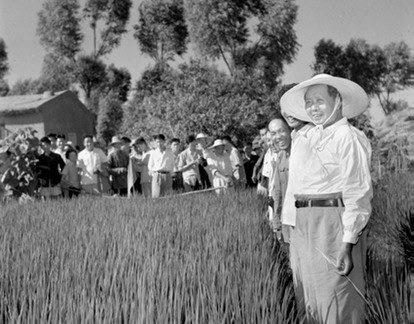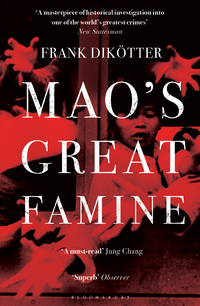The Wall Street Journal, 11 November 2010
The Great Leap Into Murder and Famine
Newly, albeit selectively, opened archives paint a clearer picture of one of China's darkest eras.
Despite its pervasive economic inequality, China today is a country of abundance in at least one respect: food. Hundreds of specialized clinics have sprung up to help manage a surge in childhood obesity. At 10% of the population, China's diabetes rate is approaching U.S. levels. So it's hard to imagine that less than 50 years ago the country was ravaged by the deadliest famine the world has ever known.
The Great Leap Forward, Mao Zedong's campaign to turn a poor agrarian society into an economic power overnight, is a subject not easily broached among contemporary Chinese. For many of those who lived through them, the events of 1958-62 are deeply repressed and painful memories. The Communist Party has also imposed a selective historical amnesia in order to exonerate itself for past crimes. Frank Dikötter's thoroughly researched book will help ensure that the country's present-day insecurities do not allow this dark past to be forgotten entirely.
Mao's hunger for power and absolute control, coupled with his shocking incapacity to understand economics and agriculture—which he saw only in ideological terms—turned China into a land of murderous madness. The received wisdom is that the mass starvation was due to forced land collectivization and bogus new farming "techniques" that made agricultural production plunge. The famine is known to be the consequence of ideology gone awry, during a time when a militant political attitude was worth more than centuries of agrarian experience.
Mao's Great Famine partially challenges these assumptions: Millions did die of starvation, as "revolutionary farming techniques" ruined the fields, but a huge, previously unacknowledged number also died because of the ferocious political persecution and sheer brutality unleashed by the campaign. Mr. Dikötter, a researcher at Hong Kong University, has taken advantage of the recently and only selectively opened archives of some Chinese provinces to study the events of those years, still defined by Chinese history books as "natural disasters," and to come as close as is currently possible to a tally of the dead.
His findings are astounding. Over five years, approximately 45 million people died due to starvation, neglect and persecution. As Mao and his closest allies boasted that China's economy would soon overtake those of Russia, the United Kingdom and the United States, crushingly unrealistic demands for grains and steel were being made on those below. Those who could not comply were punished, from Party officials all the way down to individual farmers. In such a brutal system, the basic values of humanity could, and did, break down.
Everything from steel production to grain planting became an allegory for war, introducing a belligerent language that can still be heard in certain Party directives today. Achieving the Party's targets at any cost became the cadres' obsession. Houses were destroyed to use their constituent mud bricks as fertilizer. Family kitchens and whole factories were melted down in order to pad out "steel" production, even though what was being turned out by such "backyard furnaces" was usually of such low quality as to be unusable.
Hungry children who stole so much as a steamed bun were beaten to death, their families declared class enemies. The sick were left to die in the street. Even cannibalism surfaced, when starving people unearthed the dead to feed themselves. In some cases, human flesh was even traded on the black market. Throughout this period, Mao kept brushing aside reports that his policies were bringing death and catastrophe; he even made sure to uphold his food-export commitments to the Soviet Union and East Germany. For Mao, maintaining China's reputation with its Communist peers was apparently more important than the lives of millions.
After four years of hell, in 1962 Liu Shaoqi, then China's head of state, dared to denounce the famine as a man-made disaster, precipitating his eventual demise. He did not criticize Mao directly, but while stating that the farmers knew bad weather was not to blame, he pointed the finger at "the central leadership" as guilty of disastrous policies. Mao saw him as his personal Khruschev, who had dared criticize Stalin after his death. And indeed Liu did succeed in sidelining Mao for several years, during which the economy began to recover.
The peace did not last long. To recover from the setback of his Great Leap Forward gone so badly wrong, Mao started preparing the Cultural Revolution, which would lead to the deaths of many of Mao's opponents, including Liu, and inflict even greater chaos on the country.
Mao's Great Famine makes for very grim reading in parts. But the sheer volume of previously hidden facts allows a much clearer and more damning picture to emerge, making a critical contribution to Chinese history.

